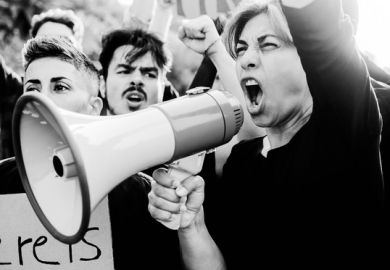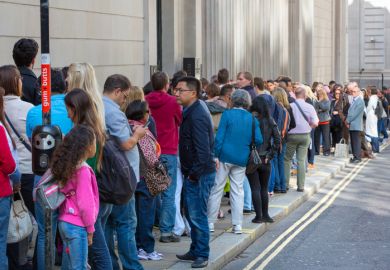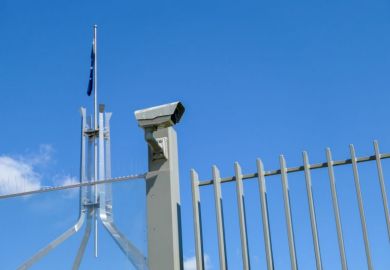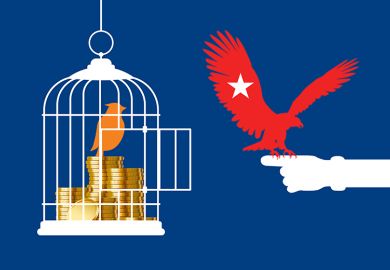On 19 February 1616, the Inquisition asked a commission of expert theologians about Galileo’s heliocentric view of the universe. Five days later, this group determined that this view was “foolish and absurd in philosophy”. In 1633, Galileo was found “vehemently suspect of heresy” and spent the rest of his life under house arrest.
In Western democracies today, we don’t (usually) imprison academics for views deemed absurd or heretical. Yet plenty of academics have been cancelled, sanctioned or dismissed in the last decade for exercising their free speech rights – a phenomenon sometimes referred to as the free speech crisis.
In March, the Office for Students published its long-awaited provisional guidance on steps English institutions should take to secure free speech within the law. A recent article in Times Higher Education by Naomi Waltham-Smith and James Murray criticises this guidance for too-great protection of lawful speech. They say academic work must “fall within or flow from the academic’s research or professional expertise and meet minimum professional standards” to qualify for academic freedom protections and “the boundaries of academic freedom should be carefully guarded to justify the authorial power that academic expression is accorded and to preserve its societal and epistemic value”.
But by whom would it be guarded? Who determines societal and epistemic value and how an academic’s expertise should be ascertained? These are far from clear in many disciplines, especially within the arts, humanities and social sciences. There is frequently a lack of clarity on “professional standards”, as demonstrated by David Card and Alan B. Krueger’s contrarian 1995 work on the minimum wage, which one (representative) mainstream economist likened to “repealing the law of gravity” but which later won a Nobel prize.
If a court were required to ascertain academic expertise and professional standards before it could enforce academic freedom rights, it would be likely to ask a group of mainstream academic experts. If the work challenged academic orthodoxies on controversial or sensitive topics, these experts would be quite likely to take a negative view, as the theologians did about Galileo’s work. Yet such controversial cases are where academic freedom protections are most needed.
It is also vital for academic freedom to extend beyond disciplinary boundaries. Scholars coming “from outside” can often breathe new life into a discipline and help challenge orthodoxies. The ground-breaking work of the sociologist Michael Biggs on puberty blockers was ignored by the medical establishment and led to Biggs losing students, seminar invitations and friends. Yet his employer, the University of Oxford, gave him space to pursue his iconoclastic research, even beyond the confines of his discipline. Contingency of academic freedom on supposed research or professional expertise (as Waltham-Smith and Murray suggest) would place such work at risk. Indeed, it might disallow Waltham-Smith’s own dismissals of gender-critical work.
Others have not been as lucky as Biggs. The postdoctoral researcher Noah Carl, whose work drew on disparate fields of research in psychology, psychometrics, sociology and economics, was fired in 2019 by the University of Cambridge after a mobbing campaign denounced his work – without providing any evidence – as “ethically suspect and methodologically flawed” and a subsequent investigation found a risk that his appointment could “bring the college into disrepute”. The interdisciplinary philosopher Nathan Cofnas is currently facing a similar campaign relating to his essay on the controversial topic of heredity and group differences. On 5 April, Emmanuel College at Cambridge terminated its association with Cofnas, reportedly claiming the essay could “reasonably be construed as amounting to rejecting Diversity, Equity and Inclusion (DEI) policies”. A parallel University of Cambridge inquiry – which may determine whether Cofnas loses his job – is ongoing at the time of this writing.
Waltham-Smith and Murray claim the OfS guidance has overlooked the “proportionality analyses” around Article 10(2) of the European Convention on Human Rights. However, the convention provides a floor, not a ceiling, to our free speech rights. The Higher Education (Freedom of Speech) Act, which the guidance implements, requires institutions to take “reasonably practicable” steps to secure speech by academics unless the speech is unlawful or incompatible with a convention right. Article 10(2) does not create rights or obligations and therefore, contrary to Waltham-Smith and Murray's assertion, there are no new “caveats to freedom of expression”.
Nor is there any evidence for their claim that the guidance might result in “harm”. It discusses discrimination and harassment at great length, for example, and nothing in it forces institutions to protect vicious, sustained and personal attacks. Even in cases where such bullying isn’t strictly unlawful in England, the guidance makes clear that universities need only take reasonably practicable steps to secure expression and indicates that certain regulations on actions and conduct may be permissible so long as they are viewpoint-neutral.
In 1644, the poet and polemicist John Milton published Areopagitica, in which he described meeting the now blind and aged Galileo under house arrest near Florence “for thinking in Astronomy otherwise than the Franciscan and Dominican licensers thought”. The Areopagitica argues powerfully that truth should be allowed to contend openly and freely with falsehood and not be suppressed by authority. Almost four centuries on, the battles for free speech and academic freedom continue.
The OfS guidance is an inspiring, liberating and extraordinarily positive document that creates a new framework for academic freedom. It must not be watered down.
Abhishek Saha is professor of mathematics at Queen Mary University of London. Ian Pace is professor of music, culture and society and university adviser: interdisciplinarity at City, University of London. Both are writing in personal capacities.
Register to continue
Why register?
- Registration is free and only takes a moment
- Once registered, you can read 3 articles a month
- Sign up for our newsletter
Subscribe
Or subscribe for unlimited access to:
- Unlimited access to news, views, insights & reviews
- Digital editions
- Digital access to THE’s university and college rankings analysis
Already registered or a current subscriber?








